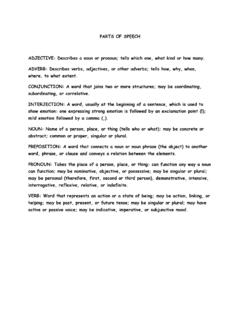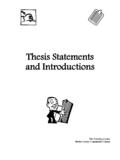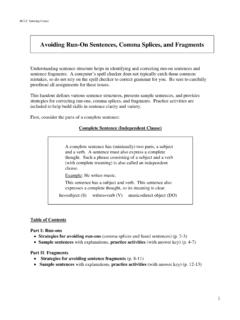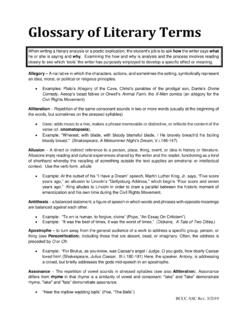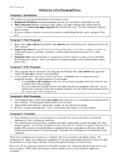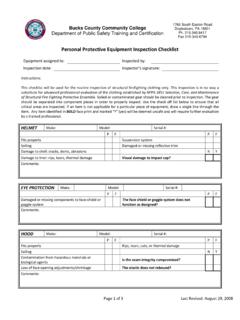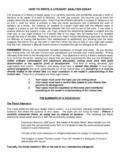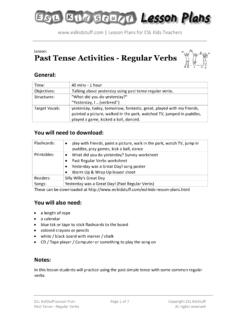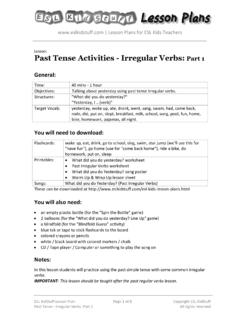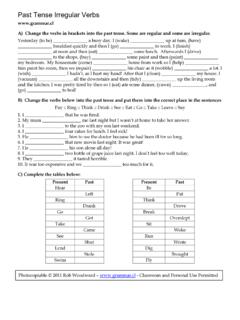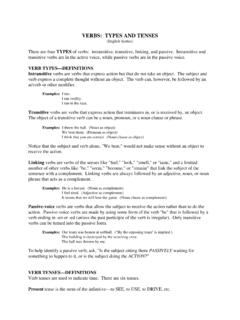Transcription of Stem-changing Verbs - Bucks
1 Stem-changing Verbs Present Tense 1. The stem or root of a verb is the beginning of the verb before the AR, -ER, or IR ending. In the present tense some Verbs may have a change in the stem. o In Stem-changing Verbs , the vowel e from the stem converts to ie, e > ie o The vowel o from the stem converts to ue, o > ue o These changes occur in all persons of the singular (yo, t , l/ella/usted) and the third person plural (ellos/ellas/ustedes) of AR, -ER, and IR Stem-changing Verbs . o These changes do not occur in the nosotros or vosotros forms. pensar (ie)- to think yo pienso nosotros pensamos t piensas vosotros pens is l/ella/usted piensa ellos/ellas/ustedes piensan perder (ie)- to lose yo pierdo nosotros perdemos t pierdes vosotros perd is l/ella/usted pierde ellos/ellas/ustedes pierden dormir (ue)- to sleep yo duermo nosotros dormimos t duermes vosotros dorm s l/ella/usted duerme ellos/ellas/ustedes duermen 2. Some IR Verbs have an e > i stem change. repetir- to repeat yo repito nosotros repetimos t repites vosotros repet s l/ella/usted repite ellos/ellas/ustedes repiten Spanish BCCC Tutoring Center Rev.
2 7/2015. Common Stem-changing Verbs o > ue e > ie e>i acostar to put to bed calentar to heat corregir to correct almorzar to eat lunch comenzar to begin elegir to elect or to chose contar to count or to tell defender to defend pedir to ask for dormir to sleep despertar to wake repetir to repeat encontrar to meet divertir to have fun servir to serve jugar (u > ue) to play empezar to begin medir to measure llover to rain encender to turn on morir to die entender to understand mostrar to show mentir to lie mover to move pensar to think poder to be able to perder to lose recordar to remember preferir to prefer so ar to dream querer to want sentar to sit sentir to feel Spanish BCCC Tutoring Center Rev. 7/2015. Preterit Tense In the preterit tense, only IR Verbs can experience a stem change. o The change only occurs in the third person singular ( l/ella/usted) and plural (ellos/ellas/ustedes) forms of the Verbs . The vowel e from the stem changes to i, e > i, like in the Verbs sentir and pedir sentir to feel pedir to ask for sent sentimos ped pedimos sentiste sentisteis pediste pedisteis sinti sintieron pidi pidieron The vowel o from the stem changes to u, o > u, like in the Verbs dormir and morir dormir to sleep morir to die dorm dormimos mor morimos dormiste dormisteis moriste moristeis durmi durmieron muri murieron For pronunciation reasons, some -AR Verbs have spelling changes that occur only in the yo-form (1st person singular) of the verb .
3 All other forms of the verb are normal. o In -AR Verbs ending in . -car, the c changes to qu tocar - to play or to touch sacar - to take out toqu tocamos saqu sacamos tocaste tocasteis sacaste sacasteis toc tocaron sac sacaron -gar, the g changes to gu pagar to pay jugar to play pagu pagamos jugu jugamos pagaste pagasteis jugaste jugasteis pag pagaron jug jugaron -zar, the z changes to c cruzar to play comenzar to pay cruc cruzamos comenc comenzamos cruzaste cruzasteis comenzaste comenzasteis cruz cruzaron comenz comenzaron Spanish BCCC Tutoring Center Rev. 7/2015. When conjugating -ER and -IR Verbs whose stems end in a vowel, note the spelling change in the third person singular (-i ) and plural ( ieron) of the verb . o The letter i from the -i and the ieron ending changes into the letter y. o The letter i on all the other forms of the verb receives an accent. This change occurs because any time there is an unaccented letter i between two vowels, the i changes to a y.
4 Creer to believe cre cre mos cre ste cre steis crey creyeron caer to fall ca ca mos ca ste ca steis cay cayeron o The -IR verb , o r, follows this same pattern. O r to hear o o mos o ste o steis oy oyeron -IR Verbs ending in -iur have a similar spelling change involving the letter y for the same reason. o These spelling changes only occur in the 3rd person singular and plural forms of the verb . This does not include Verbs ending in guir (like seguir). incluir to include inclu incluimos incluiste incluisteis incluy incluyeron construir to construct constru construimos construiste construisteis construy construyeron Spanish BCCC Tutoring Center Rev. 7/2015. Stem-changing Verbs UE Stem-changing verb Encontrar: To find, encounter Tense Eng Span Eng Span Eng Span Eng Span Eng Span Present I find Yo You find T He, she, l, ella, We find Nosotros They, you Ellos, ellas, encuentro (informal) encuentras you usted encontramos find ustedes find(s) encuentra (plural) encuentran (formal).
5 Preterit I found Yo You T He, she, l, ella, We Nosotros They, you Ellos, ellas, encontr found encontraste you usted found encontramos found usteded (informal) found encontr (plural) encontraron (formal). Imperfect I used to Yo You used T He, she, l, ella, We used Nosotros They, you Ellos, ellas, find encontraba to find encontrabas you used usted to find encontr bamos used to ustedes (informal) to find encontraba find encontraban (formal) (plural). Future I will find Yo You will T He, she, l, ella, We will Nosotros They, you Ellos, ellas, encontrar find encontrar s you will usted find encontraremos will find ustedes (informal) find encontrar (plural) encontrar n (formal). Present I find Yo You find T He, she, l, ella, We find Nosotros They, you Ellos, ellas, Subjunctive encuentre (informal) encuentres you usted encontremos find ustedes find(s) encuentre (plural) encuentren (formal). Past I found Yo You T He, she, l, ella, We Nosotros They, you Ellos, ellas, Subjunctive encontrara found encontraras you usted found encontraramos found ustedes (informal) found encontrara (plural) encontraran (formal).
6 Present I have Yo he You have T has He, she, l, ella, We have Nosotros They, you Ellos, ellas, Perfect found encontrado found encontrado you have usted ha found hemos have ustedes han (informal) found encontrado encontrado found encontrado (formal) (plural). Spanish BCCC Tutoring Center Rev. 7/2015. UE Stem-changing verb Example Sentences 1. Present Tense- He finds- Encuentra English: He finds a lot of information when he reads his history book. Spanish: Encuentra mucha informaci n cuando lee su libro de historia. 2. Future Tense- We will find- Encontraremos English: We will find what we need for the project. Spanish: Encontraremos lo que necesitamos para el proyecto. 3. Imperfect Tense- You used to find (informal)- Encontrabas English: You used to find everything. Now you can't find anything. Spanish: Encontrabas todo. Pero ahora no puedes encontrar nada. 4. Preterit Tense- They found- Encontraron English: They found a lot of information about the environment on the news last night.
7 Spanish: Encontraron mucha informaci n sobre el ambiente v a las noticias anoche. 5. Past Subjunctive Tense- She found- Encontrara English: We hoped that she found her part of the information for the group to complete the history project. Spanish: Esperamos que encontrara su parte de la informaci n para el grupo para completar el proyecto para la clase de historia. 6. Present Subjunctive- I find- Encuentre English: She hopes I find everything I need for my aunt's party. Spanish: Espera que yo encuentre todo lo que necesito para la fiesta de mi t a. 7. Present Perfect Tense- You have found (plural)- Han encontrado English: You have found a lot of information about the forests of the Americas. Spanish: Han encontrado mucha informaci n sobre los bosques de las Am ricas. Spanish BCCC Tutoring Center Rev. 7/2015. IE Stem-changing Verbs Querer: To want or to love Tense Eng Span Eng Span Eng Span Eng Span Eng Span Present I want/love Yo You T He, she, you l, ella, We Nosotros They, you Ellos, quiero want/love quieres wants/loves usted want/love queremos want/love ellas, (informal) quiere (plural) ustedes quieren Preterit I Yo quise You T He, she, you l, ella, We Nosotros They, Ellos, wanted/loved wanted/loved quisiste wanted/loved usted wanted/loved quisimos wanted/loved ellas, (informal) (formal) quiso (plural) ustedes quisieron Imperfect I used to Yo You used to T He, she, you l, ella, We used to Nosotros They, you Ellos, want/love quer a want/love quer s used to usted want/love quer amos used to ellas, want/love quer a want/love ustedes (formal) (plural) quer an Future I will Yo You will T He, she, you l, ella, We will Nosotros They, you will Ellos, want/love querr want/love querr s will usted want/love querramos want/love ellas, (informal) want/love querr (plural) ustedes (formal)
8 Querr n Present I want/love Yo You T He, she, you l, ella, We Nosotros They, you Ellos, Subjunctive quiera want/love quieras wants/loves usted want/love quieramos want/love ellas, (informal) (formal) quiera (plural) ustedes quieran Past I Yo You T He, she, you l, ella, We Nosotros They, you Ellos, Subjunctive wanted/loved quisiera wanted/loved quisieras wanted/loved usted wanted/loved quisieramos wanted/loved ellas, (informal) a person quisiera (plural) ustedes (formal) quisieran Present I have Yo he You have T has He, she, you l, ella, We have Nosotros They, you l, ella, Perfect wanted/loved querido wanted/loved querido have usted wanted/loved hemos have usted (informal) wanted/loved ha querido wanted/loved han (formal) querido (plural) querido Spanish BCCC Tutoring Center Rev. 7/2015. IE Stem-changing verb Example Sentences 1. Present Tense- We want- Queremos English: They give us what we want. Spanish: Nos dan lo que queremos. 2. Imperfect Tense- You used to want (informal)- Quer as English: You used to want to go to the park all the time.
9 Now you want to stay home. Spanish: Quer as ir al parque todo el tiempo. Ahora quieres quedarte en casa. 3. Preterit Tense- I wanted- Quise English: I wanted to go to the party last night, but my Dad didn't let me. Spanish: Quise ir a la fiesta anoche, pero mi papa no me permiti . 4. Future Tense- He will want- Querr . English: He will want to travel to different places in the world after he graduates college. Spanish: Querr viajar a lugares diferentes el mundo despu s de que se grad e de la Universidad. 5. Present Subjunctive Tense- You want (formal)- Quiera English: We hope you want to help us with the project. Spanish: Esperamos que quiera ayudarnos con el proyecto. 6. Present Perfect Tense- They have wanted- Han querido English: They have wanted to go there before. Spanish: Han querido ir all antes. 7. Past Subjunctive Tense- I wanted- Quisiera English: They wished I wanted to work with them. Spanish: Esperaron que yo quisiera trabajar con ellos. Spanish BCCC Tutoring Center Rev.
10 7/2015. I Stem-changing Verbs Pedir: To ask for, request Tense Eng Span Eng Span Eng Span Eng Span Eng Span Present I ask Yo pido You ask T He, she, you l, ella, We ask Nosotros They, you ask Ellos, ellas, for/request for/request pides asks usted for/request pedimos for/request ustedes (informal) for/requests pide (plural) piden (formal). Preterit I asked Yo ped You asked T He, she, you l, ella, We asked Nosotros They, you Ellos, ellas, for/requested for/requested pediste asked usted for/requested pedimos asked ustdes (informal) for/requested pidi for/requested pidieron (plural). Imperfect I used to ask Yo You used to T He, she, you l, ella, We used to Nosotros They, you Ellos, ellas, for/request ped a ask ped as used to ask usted ask ped amos used to ask ustedes for/request for/request ped a for/request for/request ped an (informal) (formal) (plural). Future I will ask Yo You will ask T He, she, you l, ella, We will ask Nosotros They, you will Ellos, ellas, for/request pedir for/request pedir s will ask usted for/request pediremos ask ustedes (informal) for/request pedir for/request pedir n (formal) (plural).
